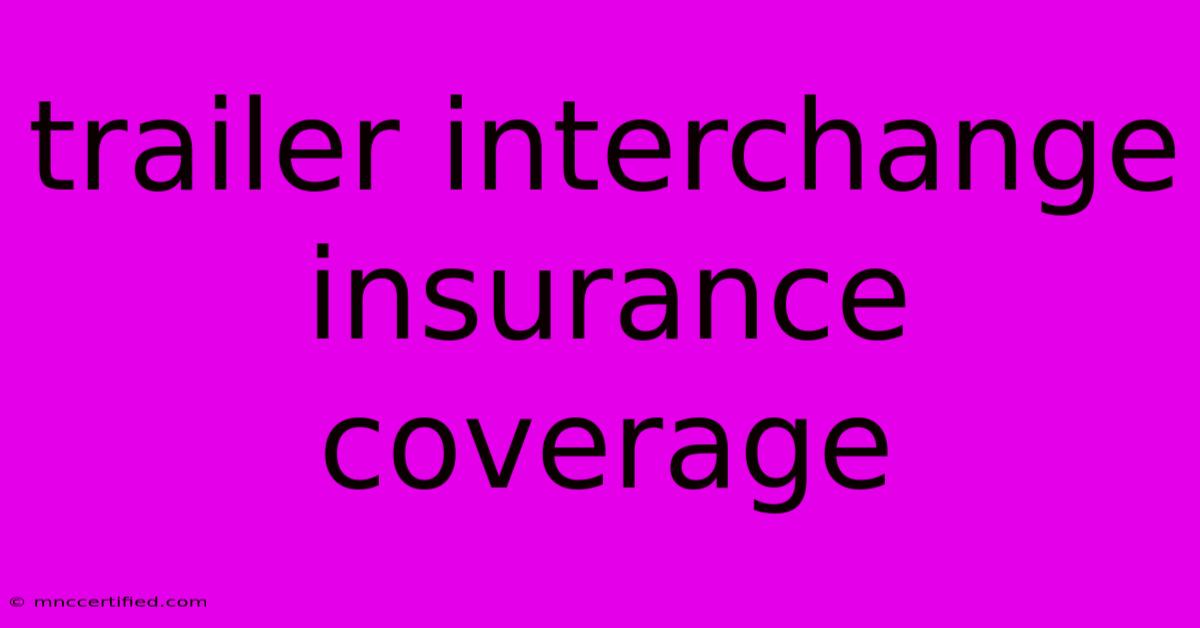Trailer Interchange Insurance Coverage

Table of Contents
Trailer Interchange Insurance Coverage: Protecting Your Business on the Road
In the fast-paced world of transportation, trailers are the backbone of efficient goods movement. But what happens when a trailer you're using isn't yours? That's where trailer interchange insurance coverage comes in.
This specialized insurance policy safeguards your business from financial losses associated with damage to or liability arising from trailers you're using temporarily. Let's dive into the intricacies of this essential coverage.
Understanding Trailer Interchange
Trailer interchange is a common practice in the trucking industry. It involves the exchange of trailers between different carriers or businesses. This allows for greater flexibility and efficiency in transporting goods, eliminating the need for each party to own a vast fleet of trailers.
However, this practice also introduces new risks. When you're using a trailer that isn't your own, you're responsible for its condition and any potential liability it may incur. This is where trailer interchange insurance becomes crucial.
Key Benefits of Trailer Interchange Insurance
Here's why trailer interchange insurance is a must-have for your business:
- Protection Against Damage: If a trailer you're using is damaged while in your possession, this insurance covers repair costs or replacement value, shielding you from significant financial burdens.
- Liability Coverage: In case of accidents involving the trailer, the insurance protects you against claims from third parties, covering legal expenses, medical costs, and property damage.
- Peace of Mind: Knowing you're covered for potential liabilities allows you to focus on your core business operations without worrying about unforeseen financial risks.
What Does Trailer Interchange Insurance Cover?
While the specific coverage can vary based on the policy, here are some common elements:
- Physical Damage: Covers damage to the trailer due to accidents, collisions, fire, theft, vandalism, and other perils.
- Liability: Protects you against claims arising from accidents involving the trailer, including bodily injury and property damage.
- Cargo Coverage: Offers protection for goods loaded onto the trailer in case of damage or loss during transit.
- Loss of Use: Covers financial losses incurred due to the trailer being unavailable for use during repairs or replacement.
How to Obtain Trailer Interchange Insurance
- Contact Your Insurance Broker: Begin by talking to your insurance broker. They can assess your specific needs and recommend the best policy options available.
- Compare Quotes: Get quotes from multiple insurance providers to find the most competitive rates and coverage.
- Read the Policy Carefully: Before signing up, make sure you understand the coverage details, exclusions, and conditions of the policy.
Tips for Maximizing Your Coverage
- Keep Detailed Records: Maintain accurate records of every trailer exchange, including dates, trailer numbers, and any damage or incidents.
- Thorough Inspection: Inspect the trailer thoroughly before taking possession to note any pre-existing damage and avoid disputes later.
- Proper Maintenance: Ensure the trailer is maintained in good condition to minimize the risk of accidents and damage.
Final Thoughts
Trailer interchange insurance is an essential investment for any business involved in trailer exchange. It provides vital protection against financial risks, allowing you to operate with confidence and peace of mind.
By understanding the benefits and obtaining the right coverage, you can safeguard your business and ensure its long-term success in the dynamic world of transportation.

Thank you for visiting our website wich cover about Trailer Interchange Insurance Coverage. We hope the information provided has been useful to you. Feel free to contact us if you have any questions or need further assistance. See you next time and dont miss to bookmark.
Featured Posts
-
Tonights Have I Got News For You Guests
Nov 09, 2024
-
India Submits 2036 Olympics Bid
Nov 09, 2024
-
U 19 World Cup Qualifiers Nepal Takes On Uae
Nov 09, 2024
-
Contractor Invoice For Insurance Claim
Nov 09, 2024
-
Clutch Play Boks Vs Irelands Climb
Nov 09, 2024